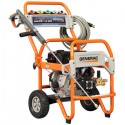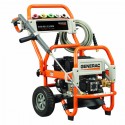Commercial Pressure Washer Reviews
These are the 7 best commercial pressure washers based on product quality, customer satisfaction, and price:
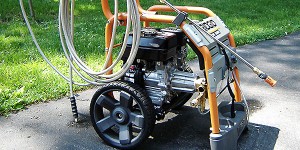 A commercial pressure washer is a great tool for cleaning a variety of indoor or outdoor surfaces, including floors, restaurant kitchens, sidewalks, fences, driveways, and job sites. These machines can be as much as ten to fifty times more powerful than a garden hose, but they also use up to eighty percent less water. Commercial pressure washers have some of the highest pound per square inch (PSI) levels and flow rates that vary widely – from about 2 to as much as 8 gallons per minute. The cleaning power of a commercial pressure washer can be calculated by multiplying the gallons per minute times the pounds per square inch. Commercial pressure washers can be used with either cold or hot water, and outflow can be combined with detergents or chemicals, depending on the surface to be cleaned and what needs to be removed.
A commercial pressure washer is a great tool for cleaning a variety of indoor or outdoor surfaces, including floors, restaurant kitchens, sidewalks, fences, driveways, and job sites. These machines can be as much as ten to fifty times more powerful than a garden hose, but they also use up to eighty percent less water. Commercial pressure washers have some of the highest pound per square inch (PSI) levels and flow rates that vary widely – from about 2 to as much as 8 gallons per minute. The cleaning power of a commercial pressure washer can be calculated by multiplying the gallons per minute times the pounds per square inch. Commercial pressure washers can be used with either cold or hot water, and outflow can be combined with detergents or chemicals, depending on the surface to be cleaned and what needs to be removed.
Commercial pressure washers are powerful enough that they can be used to remove a number of different materials from surfaces, including mold, dirt, grime and even loose paint. They are able to reduce the amount of time you spend cleaning a surface rather dramatically. When you own a painting business or are a general contractor, these machines can knock the amount of time you have to spend prepping an area for priming, patching or other renovations down considerably.
Because of this, commercial pressure washers are heavily favored in the trades and by many contractors. A job of prepping a surface that would take hours can be trimmed down to a matter of minutes with a commercial pressure washer. These machines are just as useful for professional landscaping companies, as they can be used to clean walkways and equipment quickly and efficiently.
Commercial pressure washers come in a variety of styles, sizes, and performance ability, and it is important to understand the differences so you can be sure you are getting exactly what you need for the type of job you have to do. Commercial pressure washers can be powered by a variety of sources, including gas and electric, and for very heavy duty jobs, diesel and even hydraulic powered models are available. Gas powered models are often favored by professional contractors and landscapers due to the fact that they have greater mobility, but for indoor use, electric power washers are generally preferable, as they do not produce fumes that could present problems in enclosed spaces.
Pressure washers can be fairly compact and portable, weighing less than a hundred pounds, and can go all the way up in size and power to truck-mounted and trailer-mounted layouts. For the average contractor, painting company, or landscaper, however, smaller models have all of the power and performance you would need for the average job. Pricing for commercial pressure washers can be quite variable, depending on the PSI, power source, manufacturer, and accessories and other factors. For most commercial operations, however, a pressure washer is out there that will get the job done quickly and efficiently and be well within whatever the budget allows for.
1. Commercial Pressure Washer Selection Criterias
1a. Pressure & Flow Rate
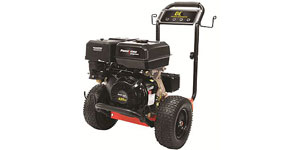 The pressure and flow rate of your commercial pressure washer are going to be two of the most important criteria to consider when you shop. These are major determinants of the overall ability and effectiveness of a pressure washer when it comes to quickly and efficiently cleaning a surface. Commercial pressure washers generally have pressures of over 3,000 pounds per square inch; this is more than four times the pressure in a coin operated car wash, to give you an idea of how strong they are.
The pressure and flow rate of your commercial pressure washer are going to be two of the most important criteria to consider when you shop. These are major determinants of the overall ability and effectiveness of a pressure washer when it comes to quickly and efficiently cleaning a surface. Commercial pressure washers generally have pressures of over 3,000 pounds per square inch; this is more than four times the pressure in a coin operated car wash, to give you an idea of how strong they are.
Commercial pressure washers with the highest PSI can remove obstinate substances from porous surfaces, especially when combined with chemicals or detergent. For example, commercial pressure washers with very high higher PSI, when used with a mix of water and chemicals, can strip painted graffiti from brick walls in a matter of minutes without doing any appreciable damage to the wall. But even those commercial pressure washers with lower PSIs still have a broad range of tasks that they can accomplish. Any machine with a PSI of at least 2500 is going to be able to handle the majority of jobs you throw it at.
When you are deciding what kind of pressure per square inch you need in your commercial pressure washer, you have to consider what you will be using it for. If you are a landscaping contractor who will mostly be using it to clear dirt, mud, or other organic material from surfaces – for example washing a deck or your tools and equipment – an extremely high PSI is probably not necessary. But if you are a painter or general contractor who has to strip loose paint from surfaces or get stains out of concrete, a higher PSI can be very useful.
The flow rate, which measures gallons per minute, is also an important indicator of the overall washing ability of the commercial pressure washer, and on most models is between three and five, although it can go quite a bit higher on bigger models. For use on industrial and agricultural sites – cleaning construction sites, barns, heavy machinery and farm equipment – you want a higher flow rate; I recommend finding a commercial power washer that has a PSI of at least 3,000 and a flow rate of at least three or four gallons per minute. For smaller jobs – cleaning the occasional concrete stain or use on residential landscaping or subcontracting jobs – a lower flow rate and PSI will be acceptable.
1b. Power Source
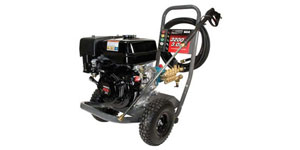 The power source is the next important thing to consider when you are shopping for a commercial power washer. There are a number of different power sources that power washers are run off of; very heavy duty ones – those mounted on trailers or truck beds – operate with diesel, hydraulic, or even pressurized steam power. But these are only for the biggest of jobs, and for most commercial uses, including residential subcontracting, landscaping, and construction site uses, portable commercial power washers that run on either gas or electric power will usually be able to get the job done. Each power source has its advantages and drawbacks, and as with any other criteria for a commercial power washer, you have to know what you will be using it for in order to decide which source is best for your needs on the job.
The power source is the next important thing to consider when you are shopping for a commercial power washer. There are a number of different power sources that power washers are run off of; very heavy duty ones – those mounted on trailers or truck beds – operate with diesel, hydraulic, or even pressurized steam power. But these are only for the biggest of jobs, and for most commercial uses, including residential subcontracting, landscaping, and construction site uses, portable commercial power washers that run on either gas or electric power will usually be able to get the job done. Each power source has its advantages and drawbacks, and as with any other criteria for a commercial power washer, you have to know what you will be using it for in order to decide which source is best for your needs on the job.
Electric commercial pressure washers plug into any normal outlet and hook up to any tap or spigot – typically using cold water – and usually are able to deliver pressure at about 2,000 PSI and have average flow rates of about 1.5 to 2.0 gallons per minute. These machines are specifically designed for smaller jobs, and are also better than gas powered commercial pressure washers for indoor jobs such as paint removal, cleaning restaurant kitchens or completed construction projects, and the like. This is because they do not produce any exhaust or fumes, so they are safer than gas powered commercial washers for use in enclosed spaces. Electric commercial pressure washers are limited in two major ways, however: they are not as mobile as gas powered commercial washers, since they are tethered to an extension cord, and they are more limited in terms of their overall washing power.
For bigger, industrial style jobs – especially outdoor ones – gas powered commercial pressure washers offer a number of distinct advantages over electric powered ones. Gas powered models are able to deliver pressure at 3,000 PSI or more, and have average flow rates around 3.0 gallons per minute. These machines are perfect for cleaning outdoor job sites, stripping paint from exterior surfaces and cleaning stains out of concrete. However you should avoid using them on asphalt, especially in areas with winters where temperatures drop below freezing, as they can damage this surface. Gas powered commercial pressure washers are often capable of generating hot water, which can be useful for removing materials that are not water soluble, such as oil or grease.
1c. Style & Pump Type
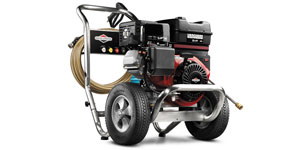 The overall style of the commercial power washer can fall into one of a few categories, and these determine the make and design of other features down the line, such as the pump type, power, and others. Commercial pressure washers can be compact, self contained units mounted on a sturdy frame with wheels that you can move along with you if you are cleaning a big surface. This style is favored by many contractors because of its versatility and ease of maneuvering around a job site. There are also smaller handheld and even wall mounted units, which are ideal for indoor uses, especially in restaurant kitchens or other food preparation sites. They often also have a hot water option for sanitizing, in spite of the fact that they are typically electric powered.
The overall style of the commercial power washer can fall into one of a few categories, and these determine the make and design of other features down the line, such as the pump type, power, and others. Commercial pressure washers can be compact, self contained units mounted on a sturdy frame with wheels that you can move along with you if you are cleaning a big surface. This style is favored by many contractors because of its versatility and ease of maneuvering around a job site. There are also smaller handheld and even wall mounted units, which are ideal for indoor uses, especially in restaurant kitchens or other food preparation sites. They often also have a hot water option for sanitizing, in spite of the fact that they are typically electric powered.
The largest style of commercial pressure washers are vehicle mounted: these are the biggest, toughest models and have much higher PSIs and flow rates. They can be mounted in the bed of a pickup truck or on a trailer, and are almost always gas powered, although some units have electric starts. These machines allow you to pressure wash whatever structure you can park your truck or trailer near, and are great for cleaning the exteriors or commercial buildings and other oversized structures. This style is only for professionals with rather big operations: they have the kind of commercial price tags that heavy duty equipment tends to carry.
Within the different styles, you can opt for one of two general pump types: axial cam and triplex. Axial cam pumps operate by using a series of pistons arranged in a circular array inside of a cylinder block. Triplex pumps have three pistons that work together to create pressure, and have become more widespread in recent years due to innovations in their design and manufacturing.
Commercial pressure washers with axial cam pumps tend to have lower PSI ratings and lower flow rates. Triplex pumps are superior for professionals who will be using them on bigger jobs, subjecting them to use more often, and generally applying them to more difficult tasks. This is not only because commercial pressure washers with triplex pumps have higher PSI and flow rates, but their overall design allows them to have a longer life expectancy and greater total efficiency. Commercial pressure washers with triplex pumps do tend to be a bit more expensive than washers with axial cam pumps.
1d. Accessories
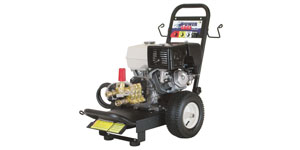 Once you have narrowed down your decision in terms of power source, flow rate and pressure, and gotten familiar with the different design styles and pumps, you should have a pretty clear idea of what kind of commercial power washer will be best for your business’s needs. At this point, the goal is to further refine the search to find the perfect commercial power washer, and a great way to do this is by looking at the different accessories each model offers. Commercial power washers are more than just a high powered pump and a hose, and their ability to help you effectively complete a job goes far beyond just the metrics that determine PSI and flow rate.
Once you have narrowed down your decision in terms of power source, flow rate and pressure, and gotten familiar with the different design styles and pumps, you should have a pretty clear idea of what kind of commercial power washer will be best for your business’s needs. At this point, the goal is to further refine the search to find the perfect commercial power washer, and a great way to do this is by looking at the different accessories each model offers. Commercial power washers are more than just a high powered pump and a hose, and their ability to help you effectively complete a job goes far beyond just the metrics that determine PSI and flow rate.
There are a variety of different wands available for commercial pressure washers, and it is important to find one that has a number of different settings. This allows you change between spray types and change the pattern of the spray from narrow, high pressure sprays to wider, low pressure sprays. There are also wands that provide rotating nozzles, which combine a high pressure spray with a circular motion. Having these options can be very useful, as it provides different approaches for jobs with different requirements.
A number of models come with interchangeable nozzle tips that allow you to control the pressure and flow rate within a predetermined range, and you can select the nozzle tip to fit your cleaning project. If you are washing a surface that is not durable enough to avoid damaging it with the highest pressure setting, you can dial it back. Similarly if you are washing wood or other porous surfaces you may want the option to reduce the flow rate so the material does not become waterlogged. Nozzle tips with lower fan angles provide stripping as well as washing power, while nozzle tips with higher fan angles are used for simple washing jobs.
With a commercial pressure washer, you should try to find a model that is equipped to support injection and mixing of chemicals and detergent with the water spray. These can work with either an onboard tank that is filled up with detergent and mixes it to a preset level in the water, or with a siphoning tube that draws detergent directly from its own container. Having the ability to use chemicals and detergents greatly increases the range of substances you can quickly and efficiently clean off of a variety of surfaces.
1e. Pricing
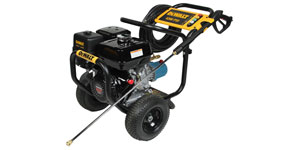 Depending on a number of various aspects, the pricing for a commercial pressure washer can fall on a fairly broad range. There are units designed for all levels of use, with varying degrees of size, PSI, flow rate, and style, and the overall price of a given unit will depend on where it ranks on each of these metrics. The biggest, most heavy duty commercial pressure washers – truck or trailer mounted units that can carry independent water reservoirs that hold hundreds of gallons, provide extremely high flow rates and PSI and carry onboard detergent tanks – are much more expensive than smaller standalone models. But even within the standalone models, pricing can vary as well, and is again related largely to the scope of what the machine is capable of doing.
Depending on a number of various aspects, the pricing for a commercial pressure washer can fall on a fairly broad range. There are units designed for all levels of use, with varying degrees of size, PSI, flow rate, and style, and the overall price of a given unit will depend on where it ranks on each of these metrics. The biggest, most heavy duty commercial pressure washers – truck or trailer mounted units that can carry independent water reservoirs that hold hundreds of gallons, provide extremely high flow rates and PSI and carry onboard detergent tanks – are much more expensive than smaller standalone models. But even within the standalone models, pricing can vary as well, and is again related largely to the scope of what the machine is capable of doing.
It is important to develop a clear idea of what kinds of jobs you will be using your commercial pressure washer for, in order to get the best sense of what kind of price range you should expect it to fall in. For small scale operations – independent contractors, house painters, and small landscaping businesses – a very large, expensive pressure washer will understandably fall outside of the budget of the operation and will generally not be necessary. For these jobs, a smaller commercial pressure washer that has limited PSI and flow rate, but still has plenty of accessories and a solid pump, will most likely be exactly what is needed, and these can be quite affordable. For bigger industrial operations and large construction companies that have the kind of budgets that can cover very large, expensive models, a truck mounted commercial pressure washer makes more sense.
Of course, it is also important to keep in mind that you do not always need to spend top dollar in order to acquire a solid, heavy duty commercial pressure washer for your operation. Within the different classes prices can also have fairly wide ranges, and buying the most expensive pressure washer does not always mean you are buying the best one. Because of that, I urge you to do careful comparison shopping from one model to the next once you have narrowed down your decision based on PSI and flow rate, power source, style, and accessories. Often, you will be able to find very similar models that offer the same product specs but have very divergent prices. Be sure you are getting a durable model that fits your needs at a good price.
2. Best Commercial Pressure Washer Reviews
Simpson PS4240-S 




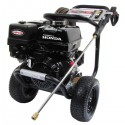
Simpson PS4240-S is the kind of serious commercial pressure washer that is designed to offer superior power and performance over the long term. With an engine that is made by one of the top manufacturers in the world, it can consistently provide the kind of reliable power that you need to take care of big [...]
Simpson PS3228-S 




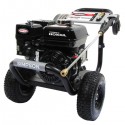
The Simpson PS3228-S is nicknamed the “Power Shot” for a very good reason. This pressure washer packs a lot of power into a relatively small space, and as soon as you unload it you can see why. This pressure washer is not the kind of huge, bulky commercial pressure washer that you will have trouble [...]
Generac 5997 




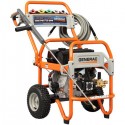
The Generac 5997 is an extremely powerful pressure washer that is designed to handle the kind of big jobs you generally encounter on subcontracting or other job sites, and it is perfect for those. It has a cleaning power rating that is well above average, and for that reason it is well equipped to deal [...]
Generac 6412 




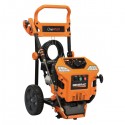
The Generac 6412 is a high quality commercial pressure washer that has a superior PSI and flow rate to other models. It has the kind of high cleaning power rating that you are going to want if you are looking for a machine that can take care of serious stains easily. Whether you are planning [...]
DeWalt DXPW4240 





The DeWalt DXPW4240 is exactly the kind of robust, heavy duty pressure washer you need to have when there are tough stains that need removal. It is a pressure washer that is built with commercial applications in mind, and because of that, it has a tough, durable body; a high performance engine made by one [...]
These are the 7 best commercial pressure washers based on product quality, customer satisfaction, and price:

